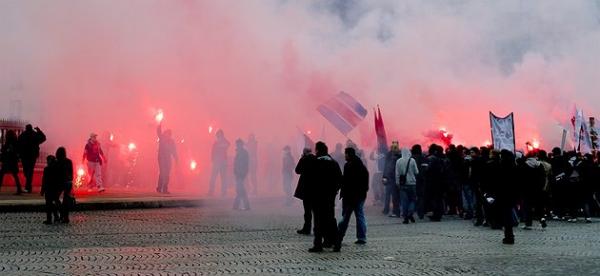UK Government Publishes Facilities Management Strategy
The government has released a guide to establishing a coordinated and aspirational FM strategy. In the document, Alex Chisholm, Chief Operating Officer for the Civil...
Read Full Article
Civil unrest is significantly more disruptive to business in France than in any other western economy, reveals a new global index released by Verisk Maplecroft, which rates the country ‘high risk’ alongside emerging markets such as Brazil and South Africa.
With a deep-rooted culture of political protest and strikes, the country is ranked 16th most at risk globally in the Civil Unrest Index.
According to Maplecroft, 'it is striking that Brazil, France, India, Mexico and South Africa, which have all witnessed substantial disorder in the last year, lack adequate structures to avoid grievances escalating into wholesale protests'. While France has an active civil society and trade unions, these tend to encourage demonstrations. In contrast, Germany (ranked equal 140th with the UK and ‘low risk’) has a more consensual political culture that supports close cooperation between trade unions, industry and government, so protest is less likely to be an option of first resort in labour disputes.
Social and civil unrest may not have featured as a major threat in the Business Continuity Institute's latest Horizon Scan Report but it was still noted as a concern for over a third of business continuity professionals.
As companies assess the viability of relocating European headquarters from the UK following the Brexit referendum, the findings provide a useful insight into some of the structural problems facing business in France. The country features among emerging markets such as India (4th), Mexico (7th), Nigeria (10th), South Africa (13th), Argentina (15th) and Brazil (21st). The only other Western European country to feature in the worst performers was Greece ranked 25th, while Italy (77th) is the next highest.
“As we’ve seen in South Africa and Nigeria, poor economic performance is also a critical bellwether for the likelihood of civil unrest,” says Principal Political Risk Analyst Charlotte Ingham. “In addition, widespread political and ethnic discrimination or corruption can inflame popular discontent and trigger significant events.”
In 2016 so far, France has experienced significant protests on a weekly basis, in comparison to Germany and the UK, where unrest that markedly disrupts business occurs on average every six months.
Attempts to reform the country’s labour laws, designed to address France’s lacklustre economic performance, have driven the most disruptive protests over the last quarter. Illustrating this was an effort to prevent the implementation of a new labour law by workers from the CGT union in May 2016. The union blocked fuel depots and six of the countries eight refineries, which saw a third of petrol stations running on empty and the government forced to dip into the country’s strategic reserves. Significant disruption to transport infrastructure in France is also commonplace. In June 2016, railway operator SNCF announced that strikes and protests were costing the company between 15 and 20 million Euro every day.
Picture: France feels threatened by terrorism and political unrest
Article written by Brian Shillibeer | Published 12 August 2016
The government has released a guide to establishing a coordinated and aspirational FM strategy. In the document, Alex Chisholm, Chief Operating Officer for the Civil...
Read Full ArticleExperts are predicting widespread staff absence rates this autumn due to a “perfect storm” of COVID-19 and early flu season. This so-called “perfect...
Read Full ArticleA storm carrying Saharan dust is causing hazy skies and layers of orange-coloured dust across southern England. What is Saharan Dust? Saharan...
Read Full ArticleA rare red weather warning for parts of the southwest has been issued by the Met Office, as significant gusts in excess of 90mph are expected. Latest warnings are...
Read Full ArticleIt remains unclear how much of a threat the new Omicron COVID-19 variant poses, so what are the definitive facts? On 26 November 2021, the World Health Organisation...
Read Full ArticleDetailed in the UK Governments Autumn and Winter Plan, option B could see the re-introduction of masks and other restrictions. What does this mean for the newly...
Read Full ArticlePrime Minister Boris Johnson recently laid out his COVID-19 winter response plan to the public, but how will it impact existing working policies? The winter...
Read Full ArticleIn light of fuel supply issues throughout the UK, more drivers than ever are considering electric vehicles. Car sales website carwow recorded that searches for EVs on...
Read Full ArticleResearch suggests that more than two-thirds of FM leaders are resistant to digital progress in the workplace. The Connected Enterprise report, produced by Sigma...
Read Full ArticleSTANLEY Security’s annual report reveals a key trend for the security industry will be mitigating health and safety risks, a direct response to the COVID-19...
Read Full Article